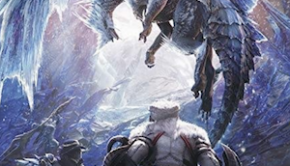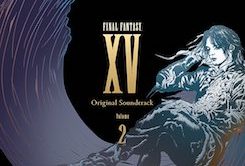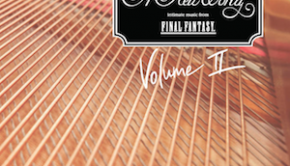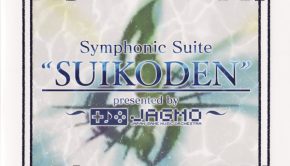Yoshino Aoki Interview: Composing for Breath of Fire and Mega Man
Yoshino Aoki is best known for her music on several of Capcom’s best-loved franchises. She wrote jazzy music for Breath of Fire III, an organic worldly soundtrack for Breath of Fire IV, a cinematic orchestral accompaniment to Shadow of Rome, and the ever-evolving scores of the Mega Man Battle Network and Mega Man Star Force series.
In this interview, Aoki provides a recollection of her experiences on all these projects for the first time. In doing so, she provides a fascinating insight into the musical, technological, and organisational aspects of game music production. Since leaving Capcom in 2007, Yoshino Aoki has co-founded the music production studio Unique Note with Tetsuya Shibata. She discusses her freelance works so far, including Suikoden Tierkreis, Luminous Arc 2, Half-Minute Hero, and the musical Rakuen.
Interview Credits
Interview Subject: Yoshino Aoki
Interviewer: Chris Greening
Editor: Chris Greening
Translation & Localisation: Yoshino Aoki
Coordination: Tetsuya Shibata
Interview Content
Chris: Yoshino Aoki, thank you so much for taking the time to speak to us today. First of us, could you tell us a bit about yourself and your musical background? What led to you eventually becoming a game composer at Capcom?
Yoshino Aoki: I’m really happy to have this opportunity to talk to you. As for my musical history, I began to learn piano and classical music when I was in elementary school. Then I started to play the flute with the wind band at my junior high school. Almost at the same time, I was also interested in some “computer music”. I think that I was affected by my father because he used to have some computers then. In high school, I also started to learn singing.
Afterwards, I studied composition in the university. One day, I played the famous video game Final Fantasy IV. I was really impressed by the music and the view of the game’s world. After I finished the game, I simply thought this, “I really want to compose for a ‘role-playing game’ some day!”
It was really difficult to find work at a huge company because of the serious economy situation. Besides, I had to study so hard at university. However, fortunately I could find a job in Capcom at first, so I was very lucky. (laugh)

Chris: To the best of my knowledge, your first work at Capcom was Mega Man X3. What was it like working with such a big team on this project and how did you assert your identity? Was it also a challenge to adapt to the limited technological capacity of the Super Nintendo?
Yoshino Aoki: That’s right, you know a lot about my work! However, I didn’t actually compose the original score, but just arranged the previous Super Nintendo version for the PlayStation adaptation. Though there was no technical limitation like the Super Nintendo, I put my best efforts into this work.
Chris: Some love Mega Man music because it’s so catchy and others feel it is a great complement to the gameplay. In your view, what is it about Mega Man music that makes it so endearing?
Yoshino Aoki: Well, there are various Mega Man series actually. If each series’ music is so popular, it may be because the compositions are so catchy, as you mentioned. In addition, we put a lot of effort to ensure that the music matches the visuals and gameplay of each series.
When I compose, I always consider what the player would feel like when they listen the music, or at least what I want them to feel. It makes it easier for me to compose likeable scores.
Chris: You’ve worked aplenty on the Mega Man series since Mega Man X3 with the three instalments of the Mega Man Battle Network franchise. Having approached these projects as a more experienced game musician, what had changed? Was it also important to bring musical contrasts between the different games?
Yoshino Aoki: Yes, to have musical contrasts is really important. Regarding these series, I never changed the atmosphere of the original Mega Man‘s score, but I just challenged myself with something new on each titles. This was especially the case on Mega Man Battle Network 3, since it was the remarkable phase of this series — I needed to use my best experience of the work on the previous games.
When I worked again on Mega Man Battle Network 6, the director of this series requested me to compose some brand new themes. So I decided to use the hardware to make the game more powerful. By the way, it was not easy to compose and express powerful sounds on this title because of the technical limitations of the Game Boy Advance.
Chris: More recently, you have been the consistent musical contributor to the Mega Man Star Force series. How did you uniquely define the tone for this franchise? How did it feel working with the DS compared with the GBA on this project?
Yoshino Aoki: The theme of this series is the growth of the main character, so I composed each score to go along with his growth as a “hero”. For example, on the original Mega Man Star Force, the director asked me to compose the music that was sorrowful, because the hero always stayed indoors!
As the series transitioned to its second and third instalments, the hero had grown up. So the director requested me to make the themes more courageous, rather than sorrowful, so that they represented a real hero.
Talking about the difference between the GBA and the DS, actually DS has the advantage of the total size of the physical memory. However, both of the consoles still had technical limitations, so I had to consider the absolute number of the voices on each.

Chris: Did you take any role in the most recent instalment of the series, Rockman EXE Operate Shooting Star?
Yoshino Aoki: Actually, I didn’t work on Rockman EXE Operate Shooting Star. However, apparently some of the music is taken from earlier instalments of the Shooting Star series that I composed for.
Chris: Of course, it was with the RPG Breath of Fire III that you became a well-known name. What inspired the jazz approach of this soundtrack given its predecessors were more orchestral and how did you adapt this genre for different contexts?
Yoshino Aoki: Akari Kaida, who was the lead-composer of this title, decided to take the jazz approach actually. I worked on this project as the co-composer. She told me that she wanted to change the image that RPG music should always be orchestral. I was very impressed by her words.
There were no clear rules in terms of the desired musical genre actually. The RPG genre needs so many different kinds of music, so we composed the each score to fit the situations of each game.
Chris: As you mentioned, you collaborated with Akari Kaida on Breath of Fire III. What was it like to work with her as opposed to working alone on the sequel? How did you actually approach the production together to achieve the best results? While I’ve been told it was approximately a 50:50 effort, could you give any more insight into who created what?
Yoshino Aoki: Akari Kaida’s business career is longer than my own, so I was able to learn from her how to develop sounds for the PlayStation too. Of course, I often prefer working with other composers than working alone.
As mentioned before, she was the lead-composer, so she decided who should compose the each scores. At that time, the lead composer usually took care of the main title and last battle music.
Chris: Of course, the Breath of Fire III soundtrack was originally an incomplete one disc release. What inspired the decision to release only a best album and how did you select the pieces? What do you think the full three disc experience brought on the series’ box set?
Yoshino Aoki: I don’t know how it came about, but back then it seemed difficult to make a complete soundtrack because there were so many tracks. As a result, we made a choice of some our favorite tunes and main themes for a one disc soundtrack release.
As for the box set’s release, actually there was no complete soundtrack for the first three instalments of the series at the time, not just Breath of Fire III. I think this provided even more impetus to release the box. The huge fans of the game always want to have a complete soundtrack release, as you know.

Chris: Moving on, your solo score for Breath of Fire IV was a completely different experience. What inspired this stylistic shift? What were your major musical influences when approaching this project?
Yoshino Aoki: First of all, the view of the world of Breath of Fire IV was quite different from the previous Breath of Fire III. In fact, there were two huge worlds and two heroes altogether. So I thought I should compose two main themes to fit the two worlds.
When I thought about the music for Fou-Lu’s world, I worried about how I should create battle music using Asian instruments. So I read an Indian music book, looked for any world music CDs, and so on. It was really hard to get the research materials of the music, as there were no Wikipedia and no YouTube back then!
Chris: During your Capcom years, you also created the music for Shadow of Rome. From both a musical and technical standpoint, how did you manage to create an epic orchestral sound for this project? Did you aim to mainly emulate cinematic composers or was it important for you to assert some of your individuality as well?
Yoshino Aoki: Talking from a technical point of view, we could use a huge wave-based musical software sampler called Giga Studio for this project. It made us quite easier to express orchestral music compared with before. In addition, I researched the PlayStation 2’s sound system to maximise the results.
As for the music, there were a range of influences. I watched the movies of ancient Rome and listened the CDs that were recorded with the musical instruments from ancient Rome. As the director used to like techno music, I mixed the genre with orchestral music for the scene of the battle race in the arena.
Chris: As a collector of Capcom soundtracks, I was pretty disappointed that Shadow of Rome didn’t receive a soundtrack release. Were you also disappointed?
Yoshino Aoki: Unfortunately, the soundtrack was not released. However, I created an original CD by myself so it remained a memorable project for me. One person from the graphic design team also designed for the artwork of the album. In the end, I donated the CD to Capcom! In that regard, it’s a phantom CD, isn’t it?
Chris: More recently, you left Capcom to become a freelancer. What inspired your original decision to leave back in 2007? What then led you to join the music production company Unique Note a few months later?
Yoshino Aoki: I had a lot of reasons for leaving, but it was mostly because I considered my future and wanted to concentrate on composing more. When I worked for Capcom as an employee, I had to do so many things to do except composing. For example, a lot of meetings, schedule checking, game checking, and more. Of course, they are an important part of game development, but I needed more time to consider composing. So I decided to change my circumstance.
Regarding Unique Note, I was looking for a business partner when I was requested to compose for the musical Rakuen. I happened to know that Tetsuya Shibata was going to leave Capcom and he also looking for the business partner. I thought it was really good situation and a great opportunity for the two of us to work together!

Chris: Away from gaming, you mentioned that you participated in the musical Rakuen and the playMaoutensyou. What was it like to work on such projects for the first time? On the latter, was it demanding to create so many vocal themes in such a short time?
Yoshino Aoki: Maoutensyou had a story like an RPG, so I could make good use of my prior experience. However, a musical is completely different in style from the music for video games, at least the ones I composed for. This was the first time I composed for a musical, and it was such hard work!
The musical director always requested us to compose extremely catchy music and great melodies. In addition, there were extremely numerous requests to change music that we had completed already. For instance, the dialog changed, the dancing changed, the story changed. In fact, there were huge changes just before the day of the recording!
We didn’t have enough time for composing and recording. It required us to work so hard, so we didn’t even have enough time to sleep. But now I think it was a good experience for us nevertheless.
Chris: On a related note, few realize that you are a talented vocalist as well as a composer. Could you discuss more about your vocal background? What was it like to sing on iconic themes for the Breath of Fire series, Mega Man Battle & Chase, and Fullmetal Alchemist PSP?
Yoshino Aoki: Actually, I started to enjoy singing after I started taking singing lessons during high school. Back then, I studied Italian songs, German songs, and operatic arias.
As for the Mega Man Battle & Chase, I just sang without any kind of doubt, but it happened to be used as an ending theme and feature on the TV-CM. This was one of my very first projects at Capcom. OnBreath of Fire IV, I was asked to sing the game’s ending theme “A Little After the Dream” once again by the producer. This was just because Breath of Fire III‘s ending theme “Pure Again” had a good reputation.
On Fullmetal Alchemist PSP, Shibata composed the music and he asked me to sing with an operatic voice. The lyrics were kind of “coined words” rather similar to the Italian language. I think no one might be able to find that the same person sang for the both music, just because my voice was quite different.
Chris: On that note, your most recent composition was for the collaborative project Half-Minute Hero. Could you discuss what it was like to compose and sing your contribution to this soundtrack?
Yoshino Aoki: On Half-Minute Hero, the client requested me to write and perform a song for the game, entitled “Triumphant Return”. Though the song was a short one, I had to compose a phrase that matched my voice well in a very short time! As a result, it was quite a challenging project.
Chris: Readers are curious to learn how you approached the similarly small freelance projects Shiki-Teiand Daletto World too. Could you please discuss the details of each of these? Did they demand as much effort as your major projects?
Yoshino Aoki: I never thought that they were “small” projects actually! It is always challenging for me to work on every new projects, and I always compose for each titles so seriously. With Shiki-Tei, I had a chance to work with Masato Koda who composed for the Monster Hunter series, and I could learn so many things from him. When I composed for Daletto World, I had to compose so many different kinds of music. There is no easy and simple job, don’t you think?

Chris: Indeed. Anyway, Suikoden Tierkreis and Luminous Arc 2 are probably your highest profile freelance works to date. How did get involved in each of these projects and what was it like revisiting the RPG genre? What were your principle musical offerings on each of them?
Yoshino Aoki: Yoko Shimomura introduced me to Yasunori Mitsuda for Luminous Arc 2. I was a huge fun of the music he composed for Xenogears, so it was really honor to work with him. However, I was really nervous too! I was affected very much by his direction when I composed for the game.
As for Suikoden Tierkreis, I suddenly received an e-mail from Norikazu Miura-san of Konami when I left Capcom. And he said “let’s work together”! I was very glad that he first thought of me when he decided to hire co-composers for the game. I wanted to take on challenges regardless of the genre of the music and the game as a freelancer. However, it actually is fun to compose for the RPG genre, because RPGs usually include a nice story and a huge view of the world.
As there were a lot of races in the world of Suikoden Tierkreis, each composer was assigned to create the themes for particular races and areas. I personally focused on the Porpos and Furious Roar parts, though it was interesting that the styles were quite different from each composer. Besides, we had a chance to recording with some live instruments, so I had a good experience in this regard too.
Chris: Now that you have completed a project at Unique Note, listeners would love to be given a hint about other projects you are working on. Also, is there anything else you’d like to say to your fans around the world?
Yoshino Aoki: Well, I can’t provide any details about upcoming projects right now, but I hope I can tell you next year! I also hope to keep singing too.
To my dear fans, I want to keep composing and I also promise to create lots of nice songs! So please keep your eyes on the Unique Note! Chris, I thank you from the bottom of my heart. You are the great person who checked my past record in detail, even though I am a composer in a corner of the world! Thank you for reading!
Posted on March 8, 2009 by Chris Greening. Last modified on March 2, 2014.














